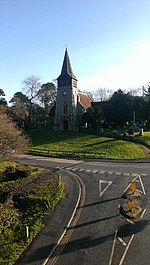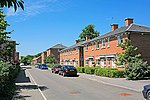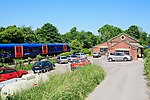Wickham () is a large village in the civil parish of Wickham and Knowle, in the Winchester district, in the county of Hampshire, England. It is about 3 miles north of Fareham. In 2021 it had a population of 2173. At the 2001 census, it the parish a population of 4,816, falling to 4,299 at the 2011 Census.Wickham has one of the oldest continuous historic market squares lined with historic buildings and is designated a conservation area. The majority of the square has been overlaid with parking spaces.
It was the fording place of the River Meon on the Roman road between Noviomagus Regnorum (Chichester) and Venta Belgarum (Winchester), and the inferred divergent point of the route to Clausentum (Bitterne). The Roman road from Wickham to Chichester is still followed today by local roads, passing behind Portsdown Hill to the north of Portsmouth Harbour and then onwards via Havant. In contrast, the route to Winchester is mostly likely lost through neglect in the Dark Ages, before present field patterns emerged.
There have been a reasonable number of sites identified nearby associated with Romano-British industry. These have mainly been pottery kilns focused around the limit of navigation of the River Hamble, near Botley. It is also here that a ford on the Clausentum road has been identified.
Wickham has occasionally been hypothesised as an alternative to Nursling (on the River Test) or Neatham (near Alton) for the Roman station Onna listed in the Antonine Itinerary. However, no definite location for Onna has been determined.
It was the birthplace of William of Wykeham, founder of Winchester College and New College, Oxford.The Admiralty Shutter Telegraph Line had a station at Wickham.
The village was an intermediate station on the Meon Valley Railway, a late Victorian route, until the line closed in 1955. At one time this railway was conceived as a direct route from London to the Isle of Wight. The closed line is now established as a cycle path and bridleway along the valley of the River Meon.
A traditional gypsy horse fair is held annually every 20 May, or another day if a Sunday, in the village square.









